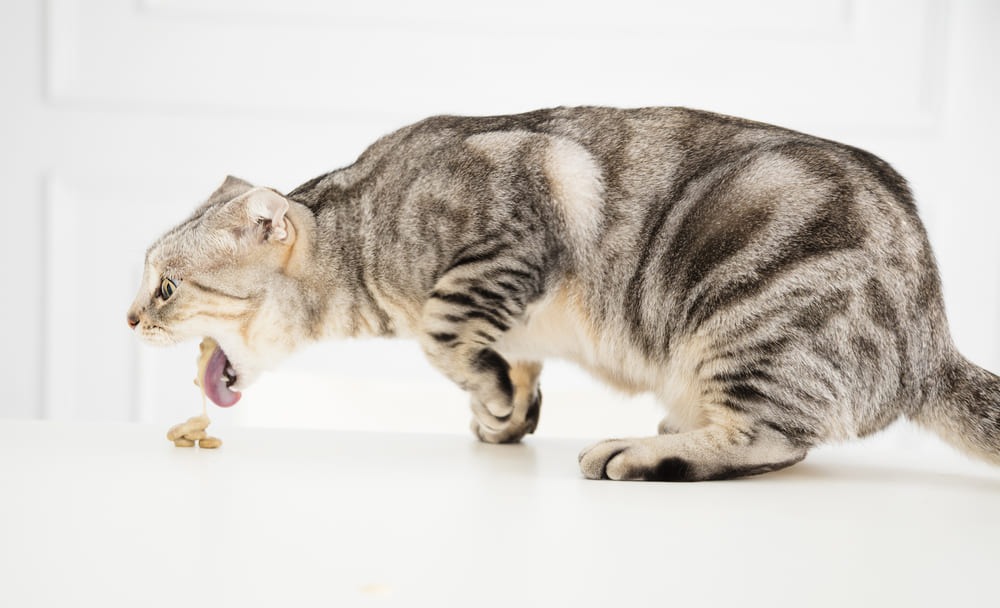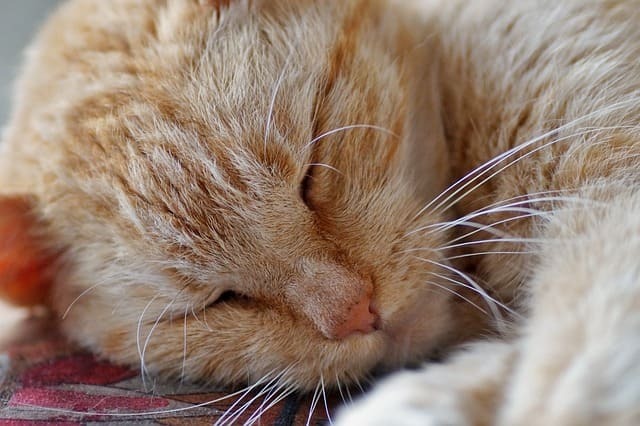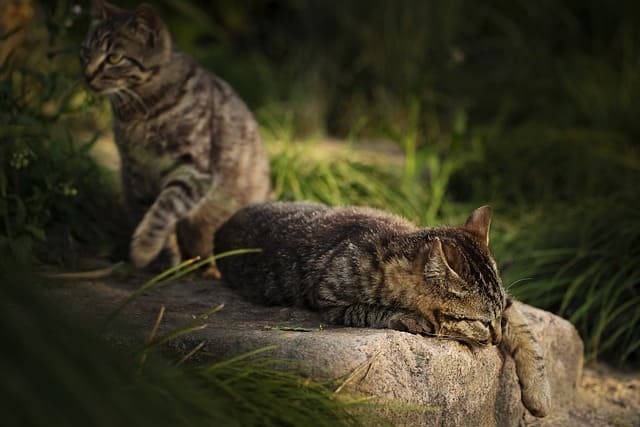
All You Need to Know About Cat Vomiting
Does feline vomiting always warrant a trip to the vet? Animalia discusses the various causes and offers tips for cat owners dealing with this common medical issue.

Health & Science
02/19/2023
7 min read
Watch your step! Vomiting is a common occurrence for cats of all breeds and ages. Sometimes it’s simply a minor inconvenience, offering no more than a nasty mess to manage. In other instances, it can point to a range of serious underlying conditions. Vomiting could even be a sign that you need to contact the veterinarian as soon as possible.
Knowing when to take your cat to the vet is important for ensuring they’re happy, healthy, and to avoid more serious trouble. From dietary indiscretion to underlying medical conditions, cats vomiting can be caused by various factors. These include intestinal parasites, bacterial infections, dietary concerns, ingestion of foreign objects, or stress. Whether your cat has an easily upset stomach or rarely ever vomits, it’s important to pay attention and take the necessary steps to safeguard your cat’s health and well-being.
Help! My cat is vomiting
In general, vomiting in cats consists of dry heaves or ejecting partially digested food, bile, or foam from the cat’s mouth. While all cats may vomit infrequently, it is important to note that persistent vomiting or vomiting accompanied by other symptoms is not normal and should always be evaluated by a veterinarian.
If your cat is exhibiting any signs of excessive vomiting or other gastrointestinal distress, it is important to seek veterinary attention as soon as possible to ensure a prompt diagnosis and appropriate medical treatment.
Causes of vomiting in cats
Cats can vomit for a variety of reasons, both gastrointestinal and non-gastrointestinal. Gastrointestinal causes of cat vomiting are typically related to something a pet has ingested or an underlying health condition affecting the GI tract. Some gastrointestinal causes of vomiting include:
- Dietary indiscretions such as eating too fast, eating spoiled food, or swallowing dangerous foreign objects
- Food intolerance and allergies
- Inflammatory bowel disease
- Certain conditions of the stomach or intestines
- Poisoning from household objects, unsafe table food, or certain plants
- Parasitic infestations
- Hairballs
- Cancers of the gastrointestinal tract

On the other hand, non-gastrointestinal causes of cat vomiting include things like:
- Stress
- Infections
- Motion sickness
- Liver disease
- Kidney disease
- Pancreatitis
- Cancer
Vomiting is oftentimes just one of many symptoms signifying these serious conditions. Be sure to always keep a close eye on your cat to spot more subtle signs of trouble like behavioral changes or aversion to food or water.
Feline inflammatory bowel disease
Feline Inflammatory Bowel Disease (IBD) is a common disorder affecting the intestines of cats. Characterized by vomiting, diarrhea, and weight loss, the condition is typically triggered by environmental factors like allergens, parasites, or bacteria.
Left untreated, IBD can lead to serious health issues like malnourishment and dehydration. Unfortunately, IBD can be tough to diagnose in cats because many conditions share similar symptoms.
If you think your cat is showing signs of IBD, it’s important to take quick action and talk to your vet sooner rather than later. Typically, veterinarians will perform a series of blood tests or x-rays to rule out other possible causes before diagnosing IBD. Diagnosis requires endoscopic biopsies of the upper or lower intestinal tract. Once the condition is diagnosed, cats may be treated with a combination of medications and dietary changes. Some cats may also require a veterinarian to administer subcutaneous fluids for addressing dehydration and electrolyte imbalances.
Pancreatitis
Pancreatitis is a common medical condition in which the pancreas (a hormone-producing organ that aids in digestion) becomes inflamed. Several different factors, including hormonal diseases, infection, or trauma can contribute to instances of pancreatitis in cats. Vomiting is among the most common signs of trouble. Pancreatitis is another condition that may grow worse and causes serious complications unless it is treated promptly. If your cat regularly vomits, take them to a veterinarian to rule out problems with their pancreas.
Chronic kidney disease
One of the most common symptoms of chronic kidney disease is cat vomiting, which can signify elevated kidney enzymes or electrolyte imbalance. Chronic kidney disease in cats is a serious condition that can lead to sickness, weight loss, and poor quality of life.
If your cat is frequently vomiting, it’s important to get your vet’s diagnosis immediately. Treatment options for chronic kidney disease usually include dietary changes, medications, and in some cases, surgery.
Feline diabetes
Like its human equivalent, feline diabetes is a serious health condition caused by an imbalance in the hormones that regulate the body’s blood sugar levels. Unmanaged, it can lead to several additional health complications, dramatically affect a cat’s standard of living, and even prove fatal.
Common signs of diabetes in cats include excessive thirst, increased urination, weight loss, lethargy, and poor coat condition. Treatments for feline diabetes may include dietary changes, insulin injections, or a combination of the two.
Hepatic lipidosis
Hepatic lipidosis, also known as fatty liver, is a serious condition. It is caused by a disruption in a cat’s metabolism, resulting in fat accumulation in the liver. This condition can result from inadequate diet, stress, or another underlying medical condition.
Signs of fatty liver include weight loss, lethargy, decreased appetite, and vomiting. If left untreated, hepatic lipidosis can be fatal. Treatment typically involves providing nutritional support, such as IV fluids and a specialized diet, as well as medications to control vomiting and other symptoms.
Chronic vomiting vs. acute vomiting
Acute vomiting is the occasional vomiting that can occur to any cat for any number of reasons. Maybe they ate too fast or encountered an ingredient that didn’t agree with them. Chronic vomiting, however, which sees pets vomit excessively, is a serious condition that requires immediate veterinary attention.
Treatments for cat vomiting
Your veterinarian may order blood or urine tests or recommend abdominal imaging like X-rays and ultrasounds to diagnose the underlying cause of your pet’s condition. The likely cause will help dictate their efforts to treat your pet’s symptoms and get them on the road to recovery.
Medications
- A veterinarian prescribes anti-vomiting medication to help control the clinical signs and reduce the frequency of vomiting. These medications work by inhibiting the vomiting center within the brain.
Make sure to consult a vet before administering any medication on your own.

Administering fluids
Cats that are vomiting can quickly become dehydrated. To avoid more serious issues, they’ll need additional fluids and electrolytes. When administering fluids orally, it is important to use electrolyte solutions specifically designed for cats. These solutions are generally more palatable to cats and can help to speed up their recovery.
When administering intravenous fluids, it is important to consider the cat’s health and size. The type of fluid, the rate of administration, and the duration of administration should all be determined by a veterinary professional.
Dietary changes
Dietary changes can often be an effective treatment for persistent feline vomiting. It’s important to start with a visit to the veterinarian to ensure there’s no serious underlying medical issue that needs to be addressed. Your vet may advise a low-fat diet, for example, if your cat suffers from pancreatitis. For cats with inflammatory bowel disease, a high-fiber diet can reduce the frequency and severity of vomiting or a hypoallergenic diet may be recommended. Cats with food allergies can benefit from an elimination diet to identify foods that trigger symptoms.
Keep cats healthy throughout their lives
Pet insurance plans offer responsible pet owners peace of mind throughout the lives of their dogs and cats. Get a quote and browse Animalia’s site today to learn more about how a policy could help you cover the cost of care.



Get your pet insurance quote
Pet type
- Dog
- Cat
What is your pet's name?
Zip code




